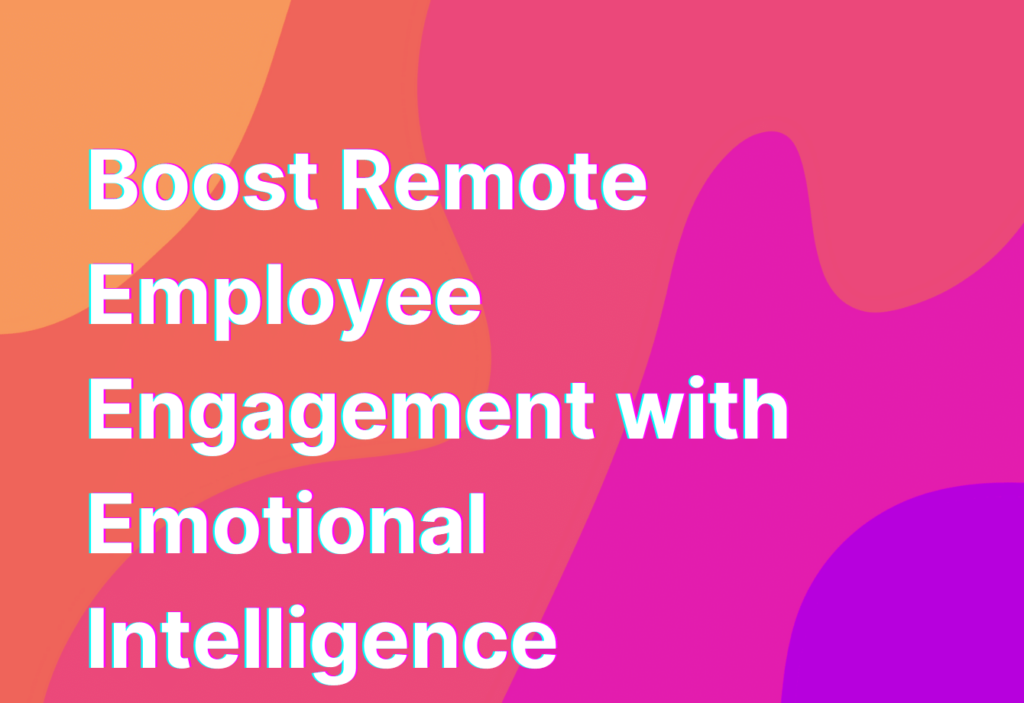Boost Remote Employee Engagement with Emotional Intelligence
Hey there, remote work enthusiasts! It’s Ashley here, your friendly remote work advocate with 10 years of experience in the tech industry. Today, I want to talk about a topic that is near and dear to my heart – emotional intelligence. Now, you might be wondering, what does emotional intelligence have to do with remote work? Well, my friends, it has everything to do with it! So, grab your favorite cup of coffee and let’s dive in!
What is Emotional Intelligence?
Before we get into the nitty-gritty of how emotional intelligence can boost remote employee engagement, let’s first understand what it actually means. Emotional intelligence, often referred to as EQ, is the ability to recognize, understand, and manage our own emotions, as well as the emotions of others. It involves being aware of our own feelings and how they impact our behavior, as well as being empathetic towards others and effectively managing relationships.
Now, you might be thinking, “Ashley, that sounds great and all, but how does emotional intelligence relate to remote work?” Well, my friend, remote work comes with its own set of challenges when it comes to communication and collaboration. Without the luxury of face-to-face interactions, it’s even more important for remote employees to have high emotional intelligence to navigate these challenges successfully.
The Benefits of Emotional Intelligence in Remote Work
Now that we have a good understanding of what emotional intelligence is, let’s explore how it can benefit remote employees and boost their engagement:
- Improved Communication: Remote work heavily relies on effective communication, and emotional intelligence plays a crucial role in this. When remote employees have high emotional intelligence, they are better able to understand and interpret the emotions behind written messages or video calls, leading to clearer and more effective communication.
- Enhanced Collaboration: Collaboration is key in remote teams, and emotional intelligence can greatly enhance this aspect. Remote employees with high emotional intelligence are more likely to be empathetic towards their colleagues, understand their perspectives, and work together harmoniously towards a common goal.
- Increased Productivity: Remote employees who possess emotional intelligence are better equipped to manage their own emotions and stay focused on their tasks. They are less likely to get overwhelmed by stress or distractions, resulting in increased productivity.
- Stronger Relationships: Building and maintaining relationships can be challenging in a remote work environment. However, remote employees with high emotional intelligence are more adept at forming meaningful connections with their colleagues, leading to stronger and more supportive relationships.
- Higher Employee Engagement: When remote employees feel understood, valued, and supported, their engagement levels soar. Emotional intelligence fosters a positive work environment where employees feel heard and appreciated, leading to higher levels of engagement and job satisfaction.
How to Cultivate Emotional Intelligence in Remote Teams
Now that we know the importance of emotional intelligence in remote work, let’s explore some practical ways to cultivate it within your remote team:
- Encourage Self-Reflection: Remote employees can benefit from taking the time to reflect on their own emotions and how they impact their work. Encourage them to journal or engage in mindfulness practices to develop self-awareness.
- Promote Empathy: Foster a culture of empathy within your remote team by encouraging team members to actively listen to each other, understand different perspectives, and practice empathy in their interactions.
- Provide Emotional Support: Remote employees may face unique challenges and stressors. As a leader, make sure to provide emotional support and create a safe space for employees to express their feelings and concerns.
- Offer Emotional Intelligence Training: Consider providing emotional intelligence training to your remote team. This can include workshops, webinars, or online courses that focus on developing emotional intelligence skills.
- Encourage Regular Check-Ins: Regular check-ins with remote employees can help you gauge their emotional well-being and address any concerns or issues they may be facing. It also shows that you care about their overall happiness and engagement.
By implementing these strategies, you can create a remote work environment that values and promotes emotional intelligence, leading to higher employee engagement and overall team success.
Wrapping Up
Well, my fellow remote work enthusiasts, we’ve reached the end of our journey into the world of emotional intelligence and its impact on remote employee engagement. Remember, emotional intelligence is not just a buzzword – it’s a valuable skill that can greatly enhance the remote work experience for both individuals and teams.
If you’re interested in learning more about boosting employee engagement in remote teams, be sure to check out our article on Flextime. It’s a game-changer!
Until next time, stay emotionally intelligent and keep rocking that remote work life!


